NBA Commissioner Adam Silver Addresses Trail Blazers Sale, Damian Lillard Trade Request
Plus, what the league's new load-management rules could mean for Portland.
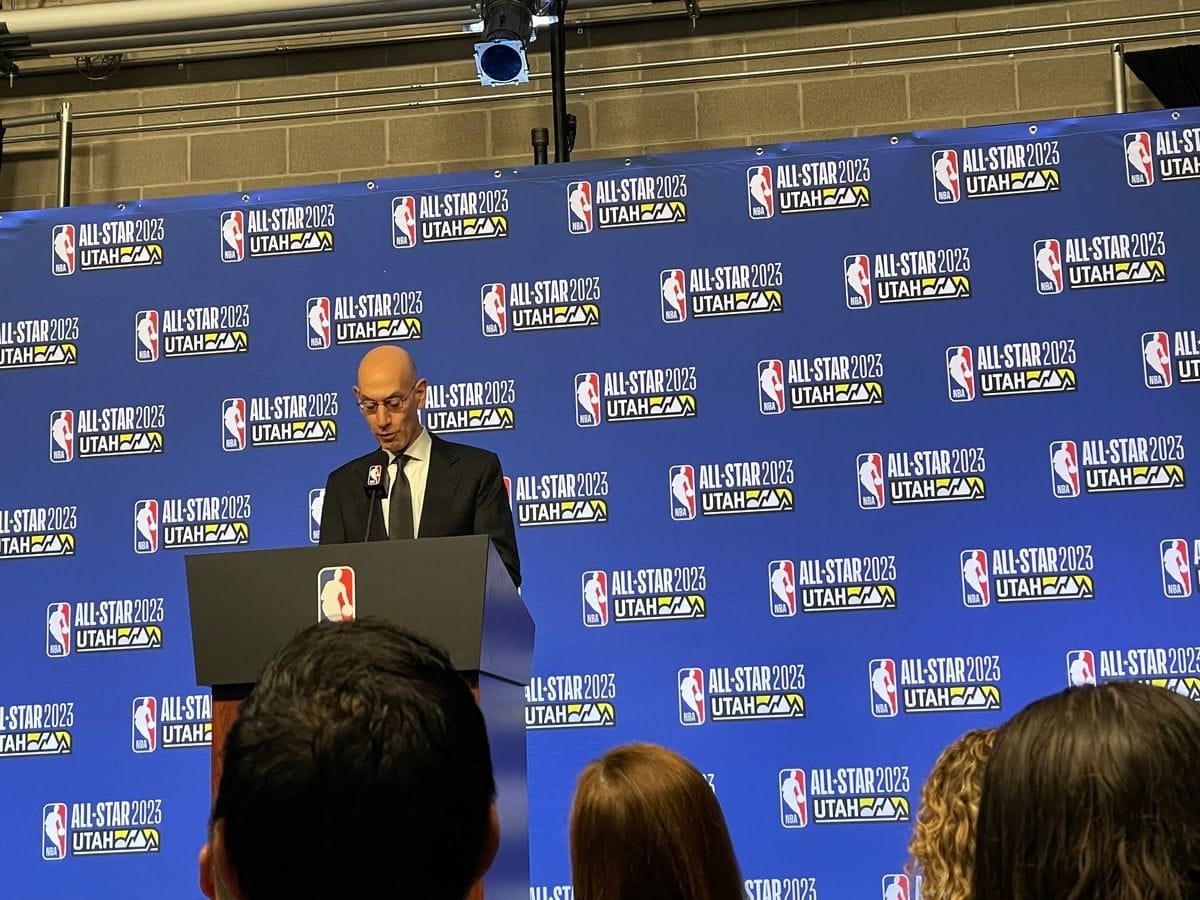
Following the NBA’s annual Board of Governors meetings in New York on Wednesday, commissioner Adam Silver gave his usual press conference. This time last year, the focus was almost entirely on the findings of the league’s investigation into then-Suns owner Robert Sarver. This time around, Silver was touting a brand-new “Player Participation Policy” designed to curb teams resting healthy players in nationally televised games, among other things.
In addition to the new policy, Silver was asked about two topics that directly involve the Trail Blazers: the ongoing uncertainty about the timing of a sale of the franchise from Paul Allen’s trust, and the optics of Damian Lillard’s still-unresolved trade request.
Silver was asked by Wall Street Journal reporter Rachel Bachman, who has done extensive reporting on the Blazers’ ownership situation, whether the league has considered mandating a sale. Here’s the commissioner’s response, in its entirety:
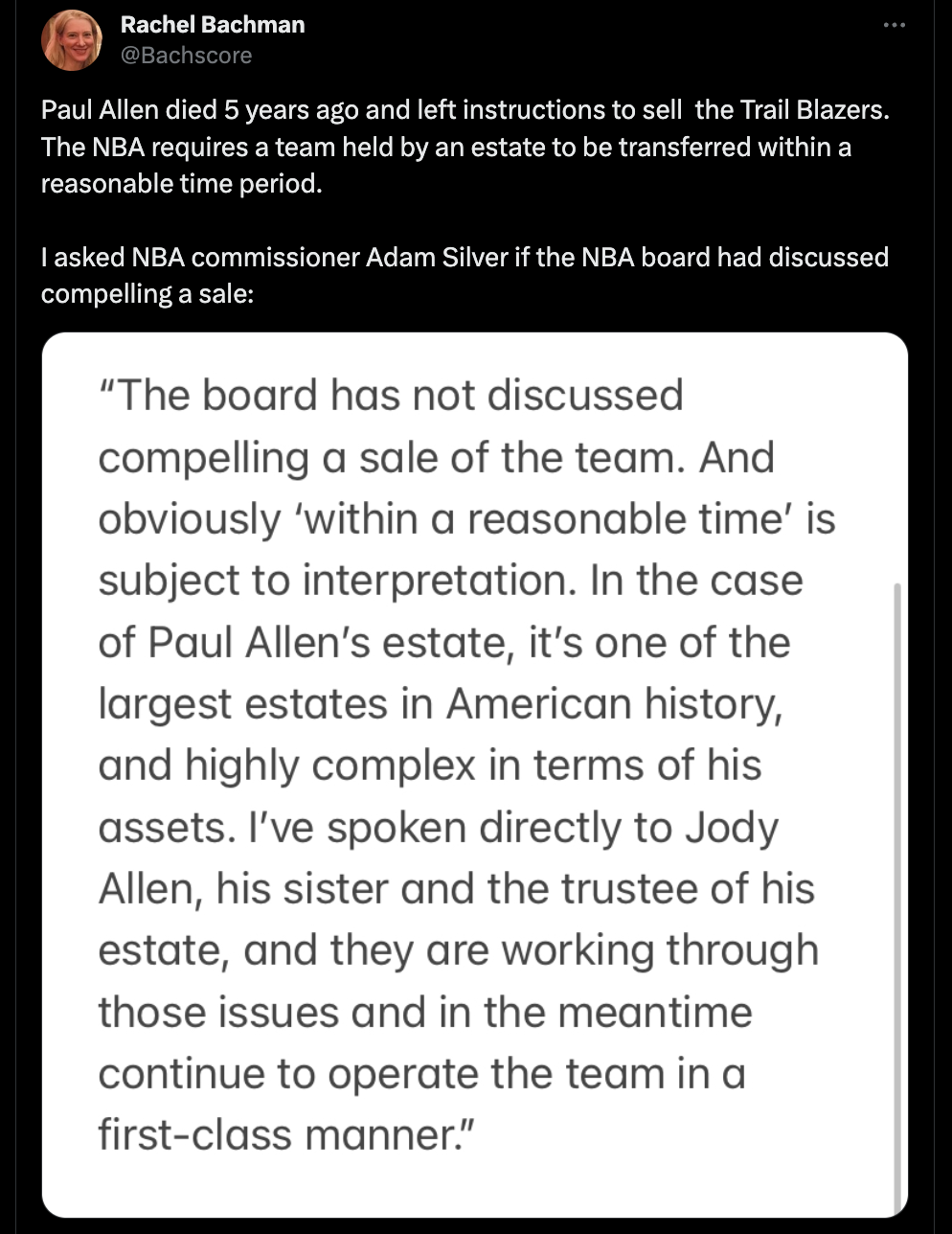
Later, longtime national NBA writer Howard Beck, who (shameless plug alert) was on my podcast last week, asked about this summer’s public trade requests from Lillard out of Portland and James Harden out of Philadelphia. Here’s Silver’s response:
“In terms of trade demands, of course, don’t like them. As a league, want players and teams to honor their contracts. And I’m watching both the situation in Portland and Philadelphia, and hope they get worked out to the satisfaction of everyone before the season starts. And I’m glad that things seem to have settled down somewhat, at least in terms of public discourse.”
Nothing earth-shattering on either front, but it’s worth breaking down where those stories currently stand, in light of the commissioner of the NBA commenting on the record about them, as well as getting into the implications of the new load-management policy and how it could affect the Blazers.
Silver’s comments on Lillard’s trade request
Silver’s response to the question about the optics of Lillard’s trade request is consistent with what he’s said at other points.
“It’s not a new issue,” he said in a February interview on ESPN, shortly after Kyrie Irving and Kevin Durant successfully forced trades at the deadline. “There’s more attention focused on it now because of the fishbowl effects of social media, and the opportunity for every single comment to be magnified. Go back to the earliest days of this league, guys are demanding trades. Having said that, of course you want players to honor their contracts. There’s always discussion between players and management about whether it’s no longer the right situation, but you never want it to get to the point where a player is literally demanding that he go somewhere else.”
In his answer on Wednesday, Silver made an implicit acknowledgement of the reality of how awkward the start of training camp (less than three weeks away!) and the regular season could be if Harden and Lillard are still in Philly and Portland — hence, “hope they get worked out to the satisfaction of everyone before the season starts.”
Of course the league office would like for this time of year to be entirely focused on teams’ respective excitement for their upcoming seasons, rather than having these uncomfortable soap operas hanging around. In an ideal world, Silver would have loved to have every major star’s employment situation settled by the time the league released its schedule last month, so they could have scheduled certain games in marquee time slots.
As it stands, they scheduled the Heat’s only visit to Portland — the Blazers’ only nationally televised game — in late February after the trade deadline, to maximize the chances that this thing is resolved and they get to play up the storyline they want on the broadcast. If Lillard had already been traded to Miami, maybe that game would have been scheduled for Christmas, or Martin Luther King Day, or one of the post-NFL Sunday matinee games on ABC. They would have liked it if Durant was traded in the early part of last summer for the same reason, too. But it doesn’t always work out there way, and with 19 days to go before media day, that is still the case.
The NBA has taken steps behind the scenes this summer to combat public trade requests, sending a league-wide memo in July warning against implying that a player wouldn’t show up if he was traded to a certain team, which came after Lillard’s agent, Aaron Goodwin, gave several on-the-record interviews in early July indicating that teams besides the Heat shouldn’t bother making an offer.
That was the last real development in the saga. Lillard no-commented the situation in an interview with ESPN/Andscape’s Marc Spears a few weeks ago. Earlier this week, a prominent national NBA insider indicated in a television appearance that Lillard wouldn’t show up anywhere but Portland or Miami, which isn’t a new rumor (or one that most people take very seriously), but because we’re in the part of the offseason where absolutely nothing else is going on, it got to take up another day’s worth of oxygen on social media.
Silver’s comments on the state of Trail Blazers ownership
Wednesday was the second time in the past 18 months that Silver has commented on the record about the timing of a Blazers sale — or lack thereof.
At his press conference before Game 1 of the 2022 Finals, on the same day ESPN first reported that Nike founder Phil Knight and Dodgers minority owner Alan Smolinisky had made a $2 billion offer for the team, Silver confirmed that the terms of Paul Allen’s trust require all of his assets to be sold at some point, but didn’t put a timeline on it.
Not much has changed now. Silver’s answer was in lockstep with what the Vulcan line has been since sale rumors started — due to the complexity and size of Allen’s estate, it will take longer than usual for everything to be unwound.
Other major assets in Allen’s trust — including two of his yachts, his impressive art collection, and Seattle’s landmark Cinerama movie theater — have been sold in the years since his death in 2018.
I’ve written numerous times in the last 18 months that my understanding has been that the Vulcans’ primary motivation right now for hanging on to the Blazers in the near term is to be able to get their share of the money coming into the league from the upcoming media-rights deal (up in 2025) and the expansion teams that are expected to follow that before the end of the decade. And unless there is a hard deadline for a sale laid out in Paul Allen’s trust that comes before then — impossible to know without seeing the trust, and Jody Allen has never spoken on the record about this — there’s nothing stopping them from holding onto the team long enough to collect that money.
I also think — and this is just an educated guess, to be clear — that the public nature of the way Knight and Smolinisky have been going about putting pressure on them to sell via last year’s New York Post hit piece has caused Jody Allen and Vulcan vice chair Bert Kolde to dig their heels in and go out of their way not to sell to them. I haven’t seen the trust, so I couldn’t tell you whether it lays out a formal sale process with an auction or if the Vulcans will have any say in who buys the team. But all indications are that they have no desire to sell to Phil Knight.
Undoubtedly, the NBA would prefer it if the Blazers had a more permanent ownership group rather than being part of a still-unsettled trust situation. But Silver’s comments on Wednesday make it sound like there isn’t much they can do to speed the process along.
How the NBA’s new load-management rules affect Lillard and the Blazers
Wednesday morning, shortly before Silver’s press conference began, the NBA’s Board of Governors formally approved a new “Player Participation Policy.” From the league’s official release:
The Player Participation Policy primarily will focus on star players. A star player for purposes of the policy is any player who, in any of the prior three seasons, was selected to an All-NBA Team or an NBA All-Star team. This definition also applies, following a given season’s All-Star Game, to any player who is named an All-Star during that season.
Under the policy, unless a team demonstrates an approved reason for a star player not to participate in a game, then, among other things, the team must:
· Manage its roster to ensure that no more than one star player is unavailable for the same game.
· Ensure that star players are available for all national television and NBA In-Season Tournament games.
· Maintain a balance between the number of one-game absences for a star player in home and road games.
· Refrain from any long-term “shutdowns” in which a star player stops playing games.
· If resting a healthy player, ensure that the player is present at the games and visible to fans.
The policy includes exceptions for injuries, personal reasons and pre-approved back-to-back restrictions based on a player’s age, career workload or serious injury history.
It goes without saying that Lillard is the only player currently on the Blazers’ roster that meets the All-Star and All-NBA criteria to be considered a “star” player subject to these restrictions.
The second-to-last bullet point in the new policy is clearly targeted at what the Blazers and Mavericks did down the stretch of last season, essentially punting on competing for the playoffs when they weren’t entirely out of contention. Portland listed Lillard as out for the final 10 games of last season with “right calf tightness,” at least making it semi-believable given that Lillard legitimately did deal a calf injury in the early part of last season. But everybody on the planet could see through it, especially considering that all of their other rotation players happened to come down with seemingly minor injuries at the exact same time.
The Mavericks got investigated and fined by the league because they were especially brazen and sloppy in the messaging, but what there was no functional difference between what they did and what Portland did. And that’s exactly what the league is trying to discourage — rightfully so.
As it relates to the Blazers’ current predicament with Lillard and how they might handle the beginning of the season if he hasn’t been traded: I reached out to an NBA spokesperson on Wednesday and got clarification that the new rule prohibiting long-term shutdowns of star players is not tied to the timing of the season—meaning it applies just as much at the beginning of the season as it does down the stretch.
That would seem to indicate that if Lillard and the Blazers wanted to “mutually agree” that he stay away from the team once the season starts, that wouldn’t fly with the league unless they decided that “not wanting to make things awkward at camp” qualifies as enough of a “personal reason” to grant an exception. I have my doubts about that, but it would be an interesting test case for the NBA in trying to enforce these new rules.
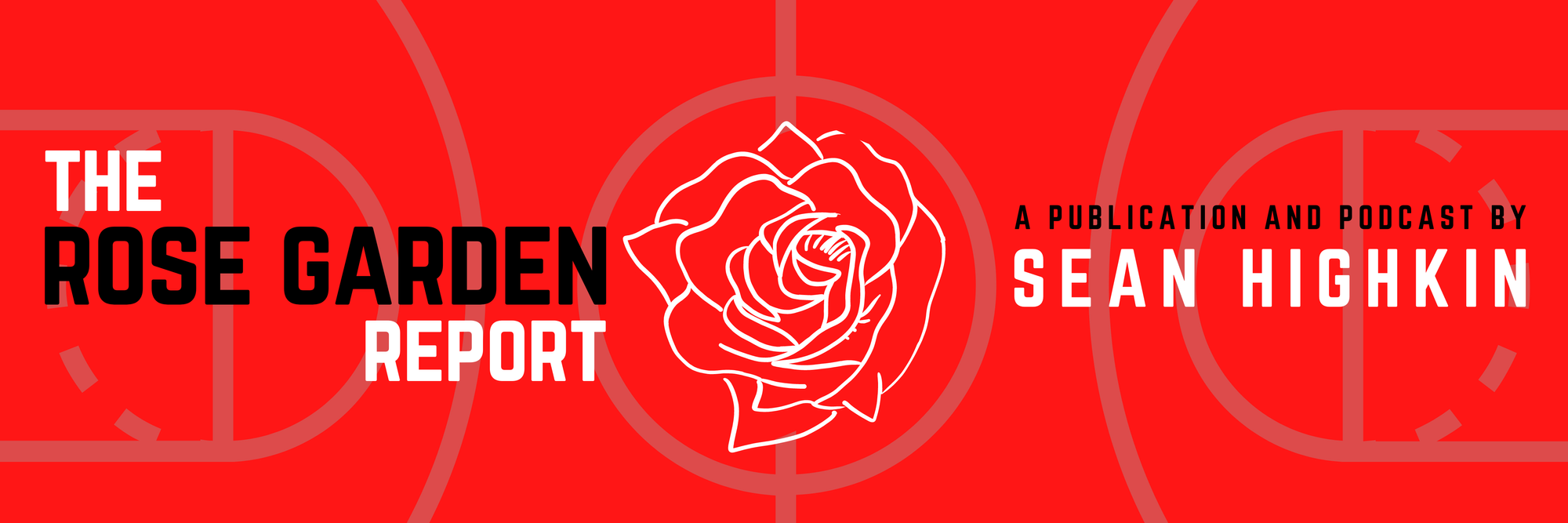
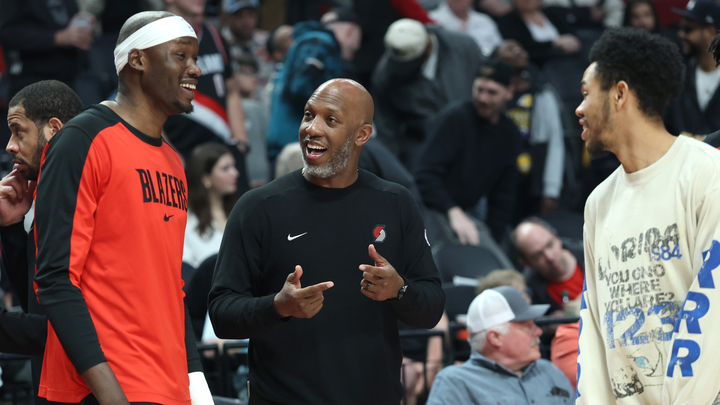
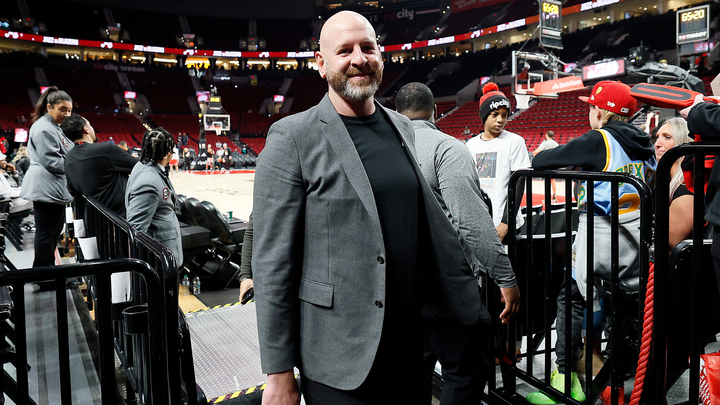
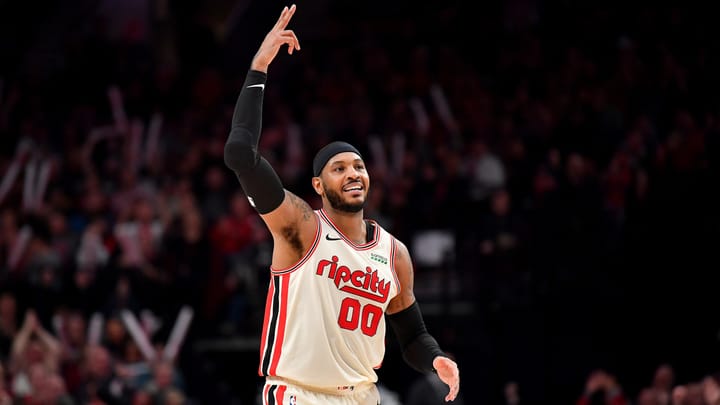
Comments ()